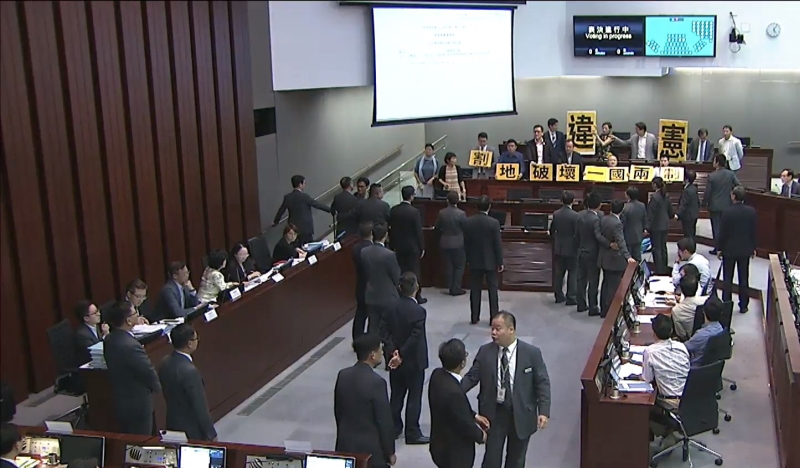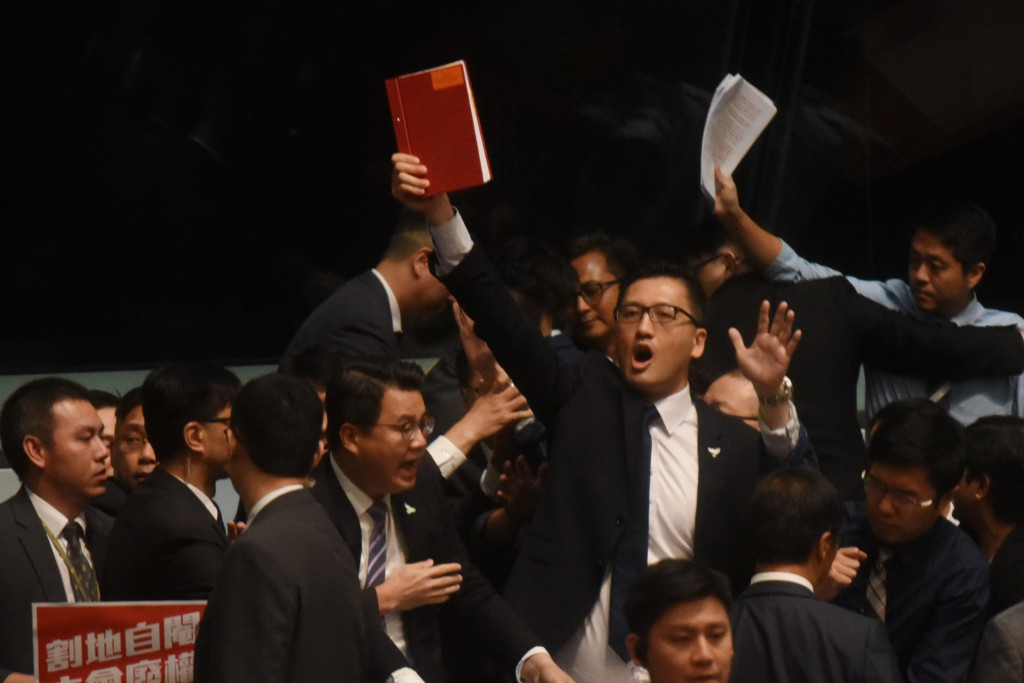During the legislative process for the controversial joint checkpoint arrangement for the Guangzhou-Shenzhen-Hong Kong Express Rail Link, the government and the pro-Beijing camp adopted unprecedented tactics to get it passed.
The public are likely to see such experimental strategies again, as they have proven to be effective. Critics have said they will likely be used to push through the upcoming national anthem law, or may even be employed in the potential return of the national security law.
1: Submitting a short bill
The Guangzhou-Shenzhen-Hong Kong Express Rail Link (Co-location) Bill lays out a framework to effectively allow Hong Kong to surrender jurisdiction across a quarter of the new West Kowloon terminus. In the mainland China-administered area, faster immigration and customs procedures will be performed by mainland law enforcement agents. Democrats and top lawyers deemed the bill unconstitutional, since the Basic Law does not provide any legal basis for efforts to “de-establish” parts of the city.

However, the bill only had eight clauses and five additional schedules. It is much shorter than most existing bills. Civic Party lawmaker Tanya Chan has compared it to “the work of a primary school colouring contest” owing to the lack of detail. The bill did not mention the duration or the rent for the lease of the terminus.
In comparison, the bill for the Shenzhen Bay Port – where Hong Kong leased land from the mainland for a joint checkpoint in 2007 – listed small details down to the use of a storage room for dangerous goods. It also had a “sunset clause” stating that the use of the area by Hong Kong will run up to June 30, 2047, unless there is an early termination or extension.
During the bills committee stage for the joint checkpoint bill, Chair Regina Ip often said lawmakers were repeating their questions – yet there were few details on the table to discuss.
2: Controlling the bills committee
Usually, the pro-Beijing camp compromises with the opposition and gives committee vice-chair seats to democrats. However, for the joint checkpoint bills committee, the pro-Beijing camp secured both chair and vice-chair seats for Regina Ip and Horace Cheung respectively. Both are members of the government’s Executive Council, who are supposed to support the administration.
The legislature’s rules do not specify to how the chair is meant to run meetings. The chair can decide the frequency and duration of meetings themselves, as well as how many times lawmakers can speak.

In fact, the committee had 18 meetings within three months. Of these, five meetings and hearings were held within one week in early April.
Secretary for Justice Teresa Cheng, one of the three ministers responsible for the bill, rarely appeared at the committee. Democrats complained that Cheng was avoiding providing answers to questions on the constitutionality of the bill.
3: Cutting short debate and setting limits
At the final stage of the bills committee, Chair Regina Ip shortened lawmakers’ speaking time from three minutes to one minute. She also allowed just ten seconds for lawmakers to vote on each of the amendments to ensure the bill would pass on time.
When the bill was sent to the LegCo’s general meeting for final scrutiny, President Andrew Leung set an unprecedented upper limit of 36 hours for the debate and scrapped the majority of amendments submitted by democrats.

Leung also decided to strip 11 lawmakers of their chance to speak during the second reading debate to ensure the debate would finish on time, even though the lawmakers had pressed the queue button to request speaking time.
4: Kicking out lawmakers; calling in the police
During the second reading, Leung kicked five pro-democracy lawmakers out of the chamber after they protested his actions. They were barred from entering the meeting the next day, even though democrats argued it was – legally – a separate meeting.
Leung has often said his decisions are final and lawmakers cannot challenge them by raising points of order – questions about meeting rules. Lawmakers have said they are considering a judicial challenge so a court to determine the scope of the president’s power.

Leung also called in the police after guards and lawmakers were both injured when the latter were being removed from the LegCo chamber. Leung defended the decision by saying that the legislature had earlier decided that the police would be called in if the legislature’s employees were injured.
Paul Tse, chair of the committee on rules of procedure, has suggested that his committee will study whether to introduce fines for lawmakers who are kicked out of meetings. He also made a suggestion that lawmakers could be barred for the rest of the legislative year if they were kicked out multiple times.
